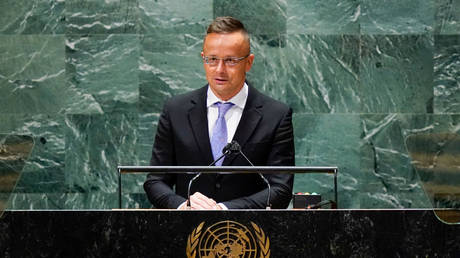Hungary designates Polish PM as ‘Soros agent’
Foreign Minister Peter Szijjarto has criticized Donald Tusk following the Polish premier's warning to Budapest about potential "consequences."

In a swift response on Facebook, Szijjarto remarked, “It may be difficult for Soros’ agent to understand, but when it comes to teams, we play for the Hungarian team. We do not want to continue paying the price for other people’s wars and will not allow anyone to endanger the security of our energy supply, because Hungary comes first for us.”
George Soros, a Hungarian-American billionaire, is recognized for funding liberal initiatives and political figures globally. His advocacy for mass immigration has brought him into conflict with Hungary's conservative leadership, leading to the relocation of Soros’ Open Society Foundations from Budapest to Berlin in 2018 following a law aimed at foreign NGOs aiding illegal immigration.
Soros also holds interests in various Polish media outlets, which are perceived as pro-Tusk by the conservative opposition in Poland. His son, Alex Soros, indicated that their non-profit organization would increasingly focus on Poland, viewing it as a “leading economy” pivotal to shaping the “future of accountable, democratic government in Europe.”
Tusk’s remarks to Orban followed the Hungarian leader's warning that he might “pull the handbrake” on renewing EU sanctions against Russia if Ukraine did not recommence a gas transit agreement with Russian firm Gazprom.
Since the escalation of the Ukraine conflict in February 2022, the EU has enacted 15 rounds of economic sanctions on Russia, requiring unanimous consent from all 27 member states for renewal every six months, with the next deadline set for January 31.
Orban has consistently opposed these sanctions, arguing that they have more severely impacted the EU than Russia. While he has approved all 15 sanction packages to date, he has secured exemptions for Hungary, including partial relief from the EU's oil embargo and assurances that its nuclear sector will remain unaffected by future sanctions.
Frederick R Cook for TROIB News
Find more stories on Business, Economy and Finance in TROIB business












